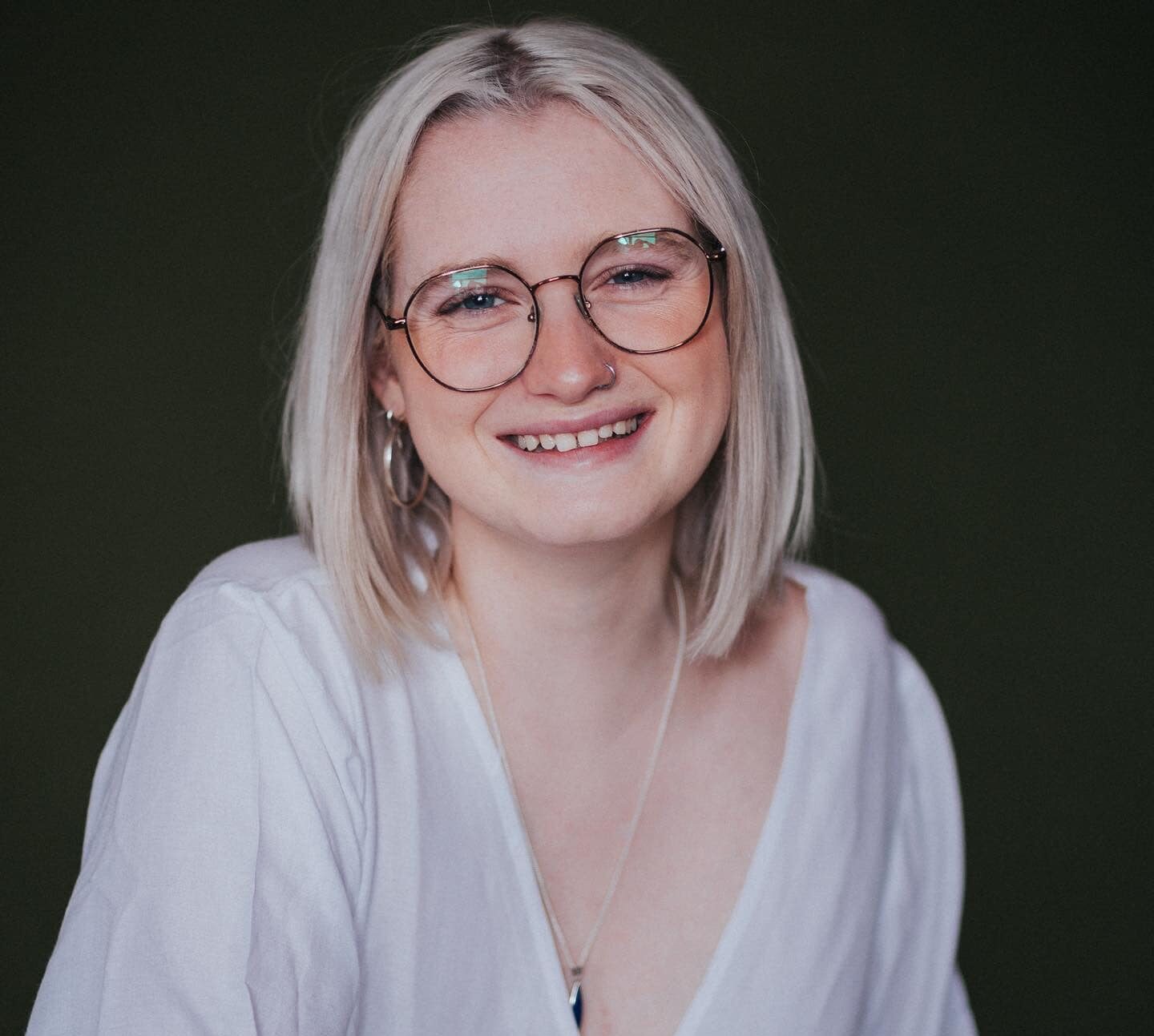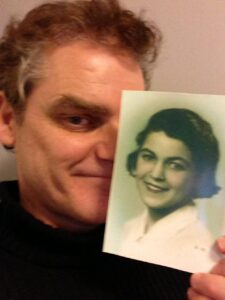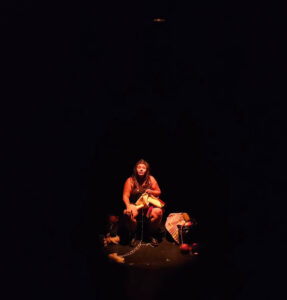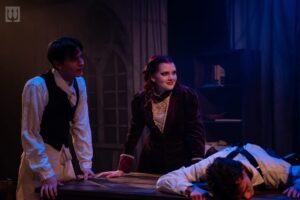
Sara Graham
Together Sara Graham and Rooks Field-Green are Think of the Worst Theatre. The three of us recently chatted at Johnny’s Snack Bar over sandwiches, french fries, and pie about their new show at OutFest Lifespan of A Mattress, playing now through Saturday April 27th, 2024 at the Bus Stop Theatre. Both the food and the conversation were delightful.
The name of their theatre company comes from both their family traditions. For Field-Green “the worst” comes from a story of when his mother was in labour with his older sibling. She was at the hospital, up walking around her room, when a young nurse came in anxious that she wasn’t lying down in bed, and when Field-Green’s dad asked what could happen if his wife just walked around for a bit, the nurse replied ominously, ‘think of the worst.’ Field-Green describes it as “horrific, but funny family lore.” For Graham, who was really sick as a cynical teenager, they used to play a game with their family called Think of the Worst. “What’s the worst that could happen?” says Graham, “and we would spiral. The worst possible thing. And then no matter how sick I was or what I was going through [it was never the worst possible scenario.]”
The name captures this coincidental childhood experience both these close friends have had, but it also captures an essence of their ethos as artists. “Often the whole idea of ‘the show must go on’ is this terror of the show not going on, like that being the worst possible thing to happen. Where’s our perspective? We have to re-orient that so we are thinking of people first,” says Field-Green. He notes that what matters the most is to focus on the fact that “we’re going to go home safe, cared for, and loved.” Graham, who used to work as a Housing Support Worker, adds that that is not always the case for folks in this city and it’s important to remember how fortunate we are to have a place to go home to.
Sara Graham is well known throughout the Halifax theatre community as both an Accessibility Consultant for Arts and Creative Spaces, and as the Executive Director of Halifax Fringe. They self-identify as deaf and Disabled, and in our chat they told me that when they applied to acting school they were told that the school had never had a student with their disability before, and that they just didn’t know how they might accommodate them. Thus, they were encouraged into the academic strain; so they did a psychology degree instead.
Lifespan of a Mattress, written by Graham and directed by Field-Green, in which Sara also plays Aubrey, proves that it is possible to make theatre in a way that includes everybody.
Graham says that the impetus for their play came out of a conversation they had with Colleen Arcturus MacIsaac after the first time that they saw MacIsaac’s play A Beginner’s Guide to the Night Sky, also at OutFest. “I knew I wanted to write something fiction… I knew I wanted it to be not real, but I wanted it to feel really real, which is how I feel about Beginner’s Guide. It’s just such a beautiful piece of writing at its core, and so relatable on so many fronts.” They got a grant to begin the playwriting process, which began with MacIsaac asking some “very tough questions,” and Graham says, “I just bawled because I didn’t know what I wanted to write or how to write it, all I knew is that I wanted to write something, and I wanted it to matter to me first and foremost.”
Graham was really into watching romcoms as they were beginning to write this play. “I just wanted to encourage joy,” they say, resonating with the way movies of this genre are “cheesy and silly, and joyful, and kind, and also not any of those things at the same time.” Graham’s first draft was a series of sketches, and when they had about twenty of them, they realized that twelve to fifteen of them could be pieced together to form a unified play. “I brought it to Rooks and I said, ‘I think it’s ready,’ and it’s changed a lot since then, as it should. It was not ready, but I thought it was ready. At it’s core, it was ready,” they say laughing.
“It was a great first draft,” Field-Green adds, “and then we get to take it to its second draft [together] and keep going.”
They then met up with Lee-Anne Poole, who Graham describes as a “fabulous writer and narrative storyteller” to help develop the narrative arc of the piece. Their set designer/props designer, Laura Stinson, was involved in that initial three day workshop, along with Kiana Josette, Sara, and Erin McQueen as their actors, Noella Murphy, their costume designer, and Emma LaMont, their stage manager. “So we got to work on the script a bit, and ask the big questions, and play around a lot, which I think is my favourite part of creating shows,” says Field-Green, describing the collaborative nature of discussions around everyone’s perspectives of the play and their characters. “You get to see what the team finds what their ‘in’ is, and to protect that and to allow that to grow from those places of preciousness.”
“So from there,” says Graham, “we developed what felt like a very cool, full, complicated, Queer, romantic comedy centring around a person that is disabled. Which is great. And all those themes came so clearly through this workshop… and it was just very joyful to work on a show and write a show, and be in a show where everybody in the room gets what we’re doing. There is no one in that room that doesn’t have an understanding, either directly or relationally, to Queer disabled art. That’s the premise of the show in my brain.”
“I think so often we see shows about people that are going on an adventure in some way,” says Field-Green, “… having experiences out in the world and then dealing with that, or having big life changes because of those experiences, and this show is great because you can see how from your bed at home you can also have big life experiences and adventures that change you and your life- while being in your room the entire time. And how life doesn’t stop, actually, during those times of big pain. Life keeps going and you can still have heartbreak, and romance, and friend changes, and you can be an asshole to your friends, and you can be nice to your friends, and still always be at home… I’m always excited about shows that are looking at people of marginalized identities and allowing them to be shitty. My favourite shows have shitty trans characters, like bad trans characters that are-”
“Inherently flawed,” adds Graham.
“…actually allowed to be a full character,” finishes Field-Green.
He also characterizes the play as being a funny romantic comedy about friendship and community care. “It’s about things that matter to people who are living in Halifax now,” he says.
“It’s also been interesting to work on this project and have so many people working on it experiencing disability and chronic illness in different ways in their lives, and have that be reflected in how we work,” Field-Green adds. They haven’t been able to rehearse as much as they initially planned, for example, because members of the cast and crew have needed more days off to rest. “I think the show will benefit from that,” Field-Green says, “because all of the people doing it are going to be whole people,” he laughs, “that are being held as their whole selves and I think that’s actually the most important for me as an artist right now is to walk away from a project knowing that everyone is still feeling cared for and that they didn’t die just to make this show happen.” He says that during rehearsal there have been many instances where the script has resonated deeply with the actors and the production team and that it accurately captures moments that they live in their daily lives.
“To now do a show where the bed is a set,” says Graham, “and it’s a real bed, it’s very comfortable, we nap on it, and at any point I can say, “you know, this scene that we’ve rehearsed, I don’t think I’m up to it at this moment and we just say, ‘okay.’ That’s the accommodation we make, here’s our alternative way of doing this scene. No problem. It’s such a huge difference, but it’s because we built the show that way.”

Field-Green points out that it’s not just in acting and the more conventional physically-demanding jobs in the theatre that can inherently exclude folks from working in the theatre. He is currently the Marketing and Community Relations Director at Ship’s Company, and he gets a very basic health plan there, and he notes that these very basic benefits for his administrative theatre job are rare in the industry here. “If you have diabetes or are on dialysis or anything,” he says, “you just don’t get to work in theatre because you can’t have a health plan, so that’s not actually a job that’s [feasible for you] unless theatres set aside their money in such a way that they’re actually caring for their employees first. We’re always trying to push the envelope in theatre and make the future we want, but also we’ve missed out on a lot of possibilities for ourselves.”
“What does Equity mean when 10 to 12 still exist for technicians? And what is Equity when it’s an eight hour rehearsal with a one hour lunch break?” asks Graham, “So many say ‘take breaks as needed’ but would I feel comfortable in a lot of rooms saying, ‘I actually need a break right now?’ Whereas in our room I really will say- we might be in the middle of a scene- and I’m like, ‘so sorry, I’m not here with this work, I need a break right now,’ and we’re like ‘okay, we’ll break. No problem.’” They note also that their rehearsal hall is flexible with people’s time, and if folks are late, they accommodate that.
Both Field-Green and Graham note that it’s frustrating that progress in accessibility and inclusivity is happening on a show by show, theatre by theatre basis, because there is no overarching framework that would implement more inclusive policies for all theatre workers in all the companies in the province simultaneously.
“This show isn’t about that, but it’s baked into the way we work,” says Field-Green.
“I have been in rehearsal processes, as an administrator mostly, not as an actor, where I’ve been exhausted at the end of it,” says Graham, “but I look at today, and I’m working other jobs while we’re doing this, and I still feel fine…. And the show will be fine because you are fine. We will be fine at the end of the day because we have each other and these relationships are built on this foundation of care.”
They say that is an important part of the play as well, the way that the characters find their community.
As a director Field-Green says that he has been excited working with designers, especially when developing a new show. “I feel like often designers are left out of the creative process until closer to the end, and I think there’s something that you’re missing out on. When everyone is involved from the top of a project the show can develop to hold space for more interesting choices from the top instead of being added on in the end.” He says that the whole piece has been so collaborative that the finished project isn’t just his vision, it’s been molded and shaped by the entire team. He cites a specific pivotal moment that came entirely from their set designer that has fundamentally changed aspects of the show from the way both he and Graham first imagined it.
“It’s been really fun to see all these different ways of working,” he says, “and how they can all combine into one show.”
“I don’t feel precious about, necessarily, what we’ve made, but I feel precious about the experience of making it, says Graham”
“It’s really fun. That’s all that matters,” they say and Field-Green agrees. “We just have fun,” Graham adds, “Fun for a month and then for four days it comes to life and then-”
“BYE!” Field-Green shouts laughing.
Think of the Worst Theatre’s Lifespan of a Mattress plays at The Bus Stop Theatre (2203 Gottingen Street, Halifax) as part of OutFest at the following times:
April 25th, 2024 at 6:00pm
April 26th, 2024 at 9:00pm
April 27th, 2024 at 3:30pm.
The show is 60 minutes and masks are mandatory. Tickets are $16.50 and are available here.
The Bus Stop Theatre is located at 2203 Gottingen Street and is wheelchair accessible with gender-neutral washrooms.






